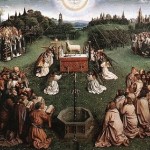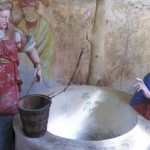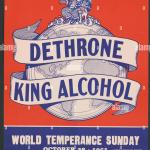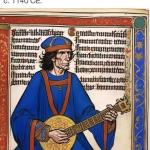Moses had a mid-life crisis. Actually, he had two of them, 40 years apart. I like the symmetry of Moses’ life, and even though I doubt I’ll live to 120, there are some hidden lessons in Moses’ life.
In Moses’ first mid-life crisis, it came into his heart to visit his brethren, the children of Israel. Although Moses was a grown man by now, he acted in an impetuous and even childish way, blindly retaliating for a fellow Hebrew he saw being oppressed. By his second mid-life crisis, 40 years later, he had learned to follow God and not try to lead Him.
In fact, the difference between the two Moseses is an illustration of two different foci we may have in our lives: a focus on self and our own abilities or a focus on God. Even the way we read this passage has hidden meaning for whether we choose the kingdom of man or the kingdom of God. For while we might (and should) draw lessons about ourselves in this passage, and Stephen told the story of Moses to answer the charges of the Jews, there is another Character we should first see in this story: and that is God Himself.
Only God in Stephen’s story can bridge the 500 years between Abraham and Moses. Only God has the staying power, both in terms of longevity and faithfulness, to fulfill His promises to Abraham and His Seed forever. It was God alone who preserved Moses, the way He also preserved Israel, and the way He still preserves His people today.
It was God who would deliver His people Israel from their afflictions. Moses had one thing right: God indeed had appointed him to be the one by whom God would deliver His people. But He had another thing wrong: it was God, in His way and in His time, who would do this.
So Moses had to wait another 40 years. This time, there would be no mistake of who was in charge. Moses had settled down and appeared to be content to dwell in Midian the rest of his days. But then the Lord appeared to Moses in the wilderness of Mount Sinai, in the burning bush that was not consumed. It was God who revealed Himself to Moses, and not the other way around. All Moses could do was tremble and not dare to look (verse 32).
It was God who came down to deliver His people, and now was the time that He had appointed, and Moses was the person He had appointed to do the delivering.
I find that too often I am like Moses when he was 40. It’s all too easy to believe, even when I believe in God and His purposes, that I’m really the one who matters. God is a fascinating but mysterious Character in our lives. We know He is there but He is often silent and invisible to us. He is actually like the Author of our stories, and we, His characters, think we have a life of our own. He is not only the Author but also the Narrator telling the story and one of the Characters, if you will.
When God appeared to Moses in the burning bush, Moses could have not doubt that it was God and that God had now come for him (Moses) to go and lead His people. But it’s not always so clear to us. It’s the difference between Moses who actually saw the burning bush and heard an audible voice, and us, who only get to read about what Moses experienced. And some of us don’t have very powerful imaginations.
There are two ways that my acting and thinking without God can get me into trouble. The first is the way of Moses, and depending on your temperament, this may be more of your temptation. It’s the way of thinking or acting as if I can do it alone. God has called me to save the Israelites. I don’t see or hear Him. There’s an Israelite being mistreated. I guess it’s up to me to do something.
The second is the way of fear. It also involves thinking or acting as if I can conquer life alone. It’s just a less cocky way of failing without God and getting into trouble. It is to be aware of how rocky life can be but to be overwhelmed by it. Knowing how hard life is, the way of fear is to still choose to try to deal with it by myself.
Both are variations on the same theme of treating God as if He is not the most important character in the story of my life and, in fact, its Author.
But your job is to keep God always as the main character and Author of your story. Don’t wait for Him to enter in stage left as a burning bush: He’s not likely to do it. The truth is, He’s already there, and your job is to acknowledge it.
Samuel Taylor Coleridge wrote about the “willing suspension of disbelief,” by which we read a work of fiction and assume its premises, even if they are, in reality, unbelievable. But living in God’s story which is your story, you are to exercise what I call the “willing activation of belief,” or, simply, faith. To enter into certain stories of fiction (including movies), I actually have to deny part of myself and what I know to be true, in order to enjoy a fantasy.
But to enter into God’s story and the story of my life, I have to accept more deeply what I know to be true but can’t readily apprehend. We have trained ourselves to read novels and enjoy movies by suspending some of who we are and believe.
Why don’t we try in the novels and movies which are our lives to imagine more fully what is most truly here: God Himself? Try it, and you’ll find that your life comes to life, and God, that most important Character, will receive the glory that is due Him.
Prayer: O God the Creator of heaven and earth, O Christ the Author of my salvation, O Spirit who animates the story of my life: I ask that You would so enter into my life today that in all things I would see You and in all my ways acknowledge You. Amen.
Points for Meditation:
1. In what ways do I need to be delivered by the Lord?
2. In what ways can I acknowledge God to be the main character in my story?
Resolution: I resolve to be prepared to look for how God will enter the story of my life today.
© 2012 Fr. Charles Erlandson















